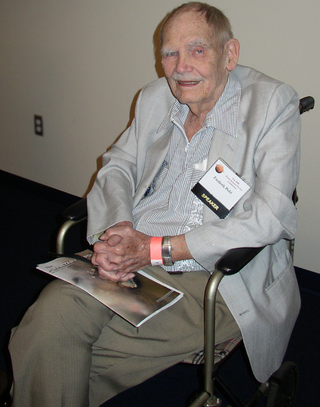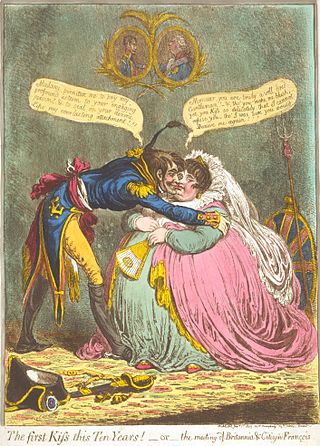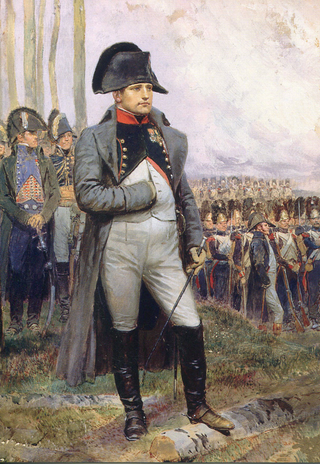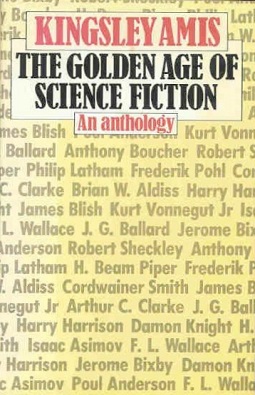Related Research Articles

Frederik George Pohl Jr. was an American science-fiction writer, editor, and fan, with a career spanning nearly 75 years—from his first published work, the 1937 poem "Elegy to a Dead Satellite: Luna", to the 2011 novel All the Lives He Led.

The Napoleonic Wars (1803–1815) were a series of conflicts fought between the First French Empire under Napoleon (1804–1815), and a fluctuating array of European coalitions. The wars originated in political forces arising from the French Revolution (1789–1799) and from the French Revolutionary Wars (1792–1802), and produced a period of French domination over Continental Europe. There were seven Napoleonic Wars, five named after the coalitions that fought Napoleon, plus two named for their respective theatres: (i) the War of the Third Coalition (1803–1806), (ii) the War of the Fourth Coalition (1806–1807), (iii) the War of the Fifth Coalition (1809), (iv) the War of the Sixth Coalition (1813–1814), (v) the War of the Seventh Coalition (1815), (vi) the Peninsular War (1807–1814), and (vii) the French invasion of Russia (1812).

Napoleon Bonaparte, later known by his regnal name Napoleon I, was a French military commander and political leader who rose to prominence during the French Revolution and led successful campaigns during the Revolutionary Wars. He was the leader of the French Republic as First Consul from 1799 to 1804, then of the French Empire as Emperor of the French from 1804 until 1814, and briefly again in 1815. Napoleon's political and cultural legacy endures as a celebrated and controversial leader. He initiated many liberal reforms that have persisted through the years, and is considered one of the greatest military commanders in history. His campaigns are still studied at military academies worldwide. Between three and six million soldiers and civilians died in the Napoleonic Wars.

The Treaty of Amiens temporarily ended hostilities between France and the United Kingdom at the end of the War of the Second Coalition. It marked the end of the French Revolutionary Wars; after a short peace it set the stage for the Napoleonic Wars. Britain gave up most of its recent conquests; France was to evacuate Naples and Egypt. Britain retained Ceylon and Trinidad.

Robert Banks Jenkinson, 2nd Earl of Liverpool, was a British Tory statesman who served as Prime Minister of the United Kingdom from 1812 to 1827. He also held many other important cabinet offices such as Foreign Secretary, Home Secretary and Secretary of State for War and the Colonies. He was also a member of the House of Lords and served as leader.

Henry Beam Piper was an American science fiction writer. He wrote many short stories and several novels. He is best known for his extensive Terro-Human Future History series of stories and a shorter series of "Paratime" alternate history tales.

Joseph Fouché, 1st Duc d'Otrante, 1st Comte Fouché was a French statesman, revolutionary, and Minister of Police under First Consul Napoleon Bonaparte, who later became a subordinate of Emperor Napoleon. He was particularly known for the ferocity with which he suppressed the Lyon insurrection during the Revolution in 1793 and for being minister of police under the Directory, the Consulate, and the Empire. In 1815, he served as President of the Executive Commission, which was the provisional government of France installed after the abdication of Napoleon. In English texts, his title is often translated as Duke of Otranto.

Napoleon I, Emperor of the French, has become a worldwide cultural icon generally associated with tactical brilliance, ambition and political power. His distinctive features and costume have made him a very recognizable figure in popular culture.

Benjamin Bathurst was a British diplomat who disappeared in Prussia during the Napoleonic Wars. He was the third son of Henry Bathurst, Bishop of Norwich, and his sister was the poet Caroline de Crespigny.
John Francis Carr is an American science fiction editor and writer as well as the executor of the literary estate of H. Beam Piper.

Napoléon is a 1955 French historical epic film directed by Sacha Guitry that depicts major events in the life of Napoleon.
Events from the year 1809 in the United Kingdom.
The Paratime series written by H. Beam Piper and subsequently by John F. Carr consists of several short stories, one novella, and one novel ; they deal with an advanced civilization that is able to travel between parallel universes with alternate histories, and uses that ability to trade for goods and services that their own, exhausted Earth cannot provide. Specifically, the Paratime series deals with the Paratime Police, the organization that protects the secret of paratime travel.

The First French Empire, officially the French Republic, then the French Empire after 1809 and also known as Napoleonic France, was the empire ruled by Napoleon Bonaparte, who established French hegemony over much of continental Europe at the beginning of the 19th century. It lasted from 18 May 1804 to 3 May 1814 and again briefly from 20 March 1815 to 7 July 1815.

The Golden Age of Science Fiction is an anthology of science fiction short stories all originally published between 1949 and 1962. The stories were selected and introduced by Kingsley Amis, who also wrote an Editor's Note and a 21-page Introduction. The collection was first published by Hutchinson in 1981 and was released in paperback by Penguin in 1983.

The Fields of Death is the fourth and final book in Simon Scarrow's Wellington and Napoleon Quartet, which tells the story of the French Revolution and the Napoleonic Wars from the point of view of Sir Arthur Wellesley and Napoleon Bonaparte.

Arthur Wellesley, 1st Duke of Wellington,, was one of the leading British military and political figures of the 19th century. Often referred to solely as "The Duke of Wellington", he led a successful military career in the Indian subcontinent during the Fourth Anglo-Mysore War (1798–99) and the Second Anglo-Maratha War (1803–1805), and in Europe during the Napoleonic Wars (1803–1815).

A Science Fiction Argosy is an anthology of science fiction short works edited by Damon Knight. It was first published in hardcover by Simon & Schuster in March 1972; a book club edition issued by the same publisher together with the Science Fiction Book Club followed in May of the same year. The first British edition was issued by Gollancz in hardcover in April 1973.

Arthur Wellesley, 1st Duke of Wellington, was an Anglo-Irish soldier and Tory statesman who was one of the leading military and political figures of 19th-century Britain, commanding the British Army during the Napoleonic Wars and serving twice as prime minister. He has frequently been depicted in various cultural media.
References
- ↑ H. Beam Piper, by Frederik Pohl, at The Way the Future Blogs; published January 10, 2010; retrieved November 19, 2018
- ↑ Blowing His Horn: The Twisted Fiction of Sarban, by Paul StJohn Mackintosh, at the Los Angeles Review of Books ; published December 7, 2016; retrieved November 19, 2018
- ↑ H. Beam Piper: A Biography, by John F. Carr (chapter 20: "Piper's History of the Future"); published January 28, 2014 by McFarland & Company